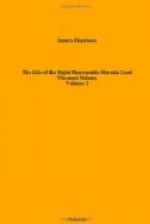As the officers were conducting him below, his lordship deliberately remarked that the tiller-rope was too slack, and requested that Captain Hardy might be told to get it tightened. In the mean time, Mr. Pollard, a young midshipman of the Victory, not more than sixteen years of age, having levelled a musket at the man who shot his lordship, the fellow was seen instantly to fall. All the surgeons being busily engaged with the wounded, our hero, as usual, insisted on waiting till his turn. The surgeon who examined the wound soon clearly discovered what must be it’s fatal effect. Lord Nelson had attentively regarded his countenance; and, on beholding him turn pale, calmly said—“It is, I perceive, mortal!”
The Reverend Dr. Scott, who was looking for his wounded friend, Lieutenant Pascoe, in the cockpit, to his utter astonishment and horror, discovered that his lordship had that moment been brought down. He immediately seated himself on the floor, and supported his pillow during the whole time of the surgeon’s operations; indeed, except for a few moments, when he was sent to call Captain Hardy, he never left him. After enquiring about the state of the battle, which the dying hero far more regarded than that of his wound, his lordship, who was much agitated, and evidently suffering the most extreme agony, suddenly exclaimed, in a hurried manner—“Doctor, remember me to Lady Hamilton, remember me to Horatia! Remember me to Lady Hamilton, remember me to Horatia! Tell her, I have made a will, and left her a legacy to my country.” This was afterward repeated, in a calmer tone, to Dr. Scott; with whom he conversed, at intervals, in a low voice, but perfectly collected. At times, the pain seizing him more violently, he suddenly and loudly expressed a wish to die. Then, again, he would grow calm and collected, and address himself to Dr. Scott; speaking in low, though broken and unconnected, sentences. At first, he expressed an eager desire for drink; saying—“Drink! drink! drink, doctor!” and continually had lemonade given him. After each time of drinking, he was a short time calm and collected, and spoke a few sentences to Dr. Scott; then, the pain again seizing him, he would hastily call out—“Drink! drink!” His lower extremities soon grew cold and insensible, and the copious effusion of blood from his lungs frequently threatened suffocation. His eyes, however, appeared to brighten, and his spirits to revive, on hearing the cheers given by the crew of the Victory as the different ships of the enemy surrendered. He




